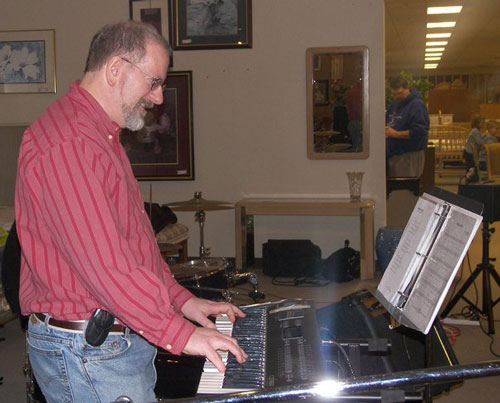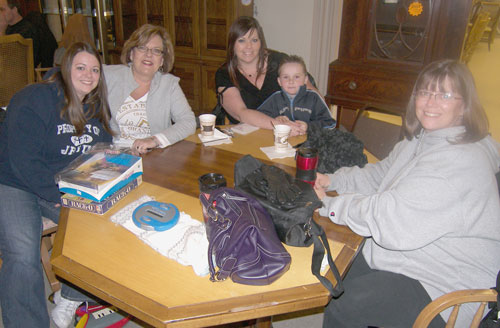A few days ago I wrote about the book “A Contrarian’s Guide to Spirituality.” Today I came across an article by the author, Larry Osborne, on Catalystspace.com. It’s basically a rewrite of one chapter from that book, “Is It a Sin to be Average?” That chapter was very thought-provoking, and I’m glad it’s getting a little more play and discussion in Christian circles.
Osborne says leaders want to make everyone into a leader, a hard-charging Christian warrior who will conquer the strongholds for Jesus. But not everyone is made that way, or can be remade that way. Osborne says that in trying to make everyone in his church into a leader, “It overwhelmed my congregation and non-leader types with unrealistic and unreachable standards of spirituality. And I’m pretty sure it ticked God off…
“Like many leaders, I believed there was something seriously wrong with low-drive Christians. I tended to project my own passion and calling onto everyone else. Since I’d heard my call so clearly, I assumed anyone who didn’t share the same vision and fervor must not be listening to what God had to say.”
But he was confused by two parishioners. “Both were as godly in character as anyone I’ve ever met, and neither had a leadership bone in them….That caused me to start wondering if perhaps my definition of sold-out Christianity was seriously flawed…if there was room in the kingdom for mediocrity.”
On the one side are driven, passionate leaders filled with a sense of urgency. “On the other side are lots of good and godly folks left to lick the wounds of countless well-intentioned but spiritually hurtful sermons, books, and seminars calling them to be something they know in their heart of hearts they can never be–and have no desire to be, if truth be known.”
Osborne concluded that churches must provide “pathways of spirituality that work for everyone,” not just for leader types. And stop making the low-drive people feel inferior and inadequate and guilt-ridden. Let them lead the totally biblical kind of life stated in 1 Thess. 4:11-12:
“Make it your ambition to lead a quiet life, to mind your own business and to work with your hands, just as we told you, so that your daily life may win the respect of outsiders and so that you will not be dependent on anybody.”
When Elijah complained that he was the only real God-follower left, God told him, “No, there are 7000 other faithful people.” I suspect God included in that number a lot of people who weren’t charging the heights, but were simply living a quiet life of faithfulness. Elijah was charging up San Juan Hill. But these other 7000 were no less pleasing to God.
We do this to laypersons, castigating the “pew-sitter” for not going out and changing the world for Christ.
We do this to churches, expecting every church to aspire to be Willow Creek.
We do this to pastors, trying to make them all fit a particular leadership mold, rather than allowing them to be who God has called and gifted them to be. Whether you pastor a church of 50, 100, 200, or 1000, you fall short of persons pastoring churches at the next level. Is there room to value a person who our sovereign God personally selected (called), and gifted, to be a great pastor to 100 people?
Osborne raises important issues. They resonated with me when I first read that chapter in his book over a year ago. And they resonated with me again as I read the same thoughts on Catalystspace.com.





 Back in December, while killing time in Barnes & Noble, I began browsing through a copy of Barack Obama’s book “The Audacity of Hope.” I opened to a random page near the middle of the book, began reading–and immediately found myself disagreeing with something he said. It had to do with an interpretation of Scripture.
Back in December, while killing time in Barnes & Noble, I began browsing through a copy of Barack Obama’s book “The Audacity of Hope.” I opened to a random page near the middle of the book, began reading–and immediately found myself disagreeing with something he said. It had to do with an interpretation of Scripture.
 The best Christian book I read in 2008 is Larry Osborne’s “Contrarian’s Guide to Knowing God.” He takes some beliefs we’ve always held as true, and sheds a whole different light on them. He doesn’t stray from orthodoxy, only from our western paradigms and interpretations. His thoughts about how people grow are particularly fascinating (as in the chapter “The Case for Meandering”).
The best Christian book I read in 2008 is Larry Osborne’s “Contrarian’s Guide to Knowing God.” He takes some beliefs we’ve always held as true, and sheds a whole different light on them. He doesn’t stray from orthodoxy, only from our western paradigms and interpretations. His thoughts about how people grow are particularly fascinating (as in the chapter “The Case for Meandering”).



